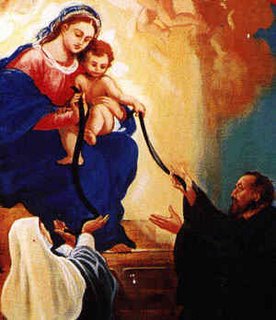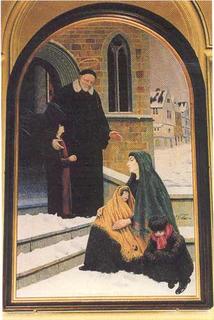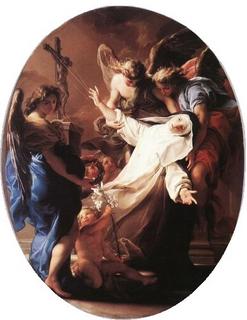
Monica of Hippo did not have an easy life, she was married to a much older man who was known for his abusive treatment of any who displeased him. Though Monica's marriage was not a match made in Heaven in that she was not in love with her husband as her marriage was an arranged one, still though she embraced the role of both wife and mother with great care and diligence.
Things were not made easier for her in that Monica also lived with her temperamental and taciturn mother in law who seemed to gain pleasure by making Monica's life as intolerable as she could. Throughout this ordeal Monica never lost her Faith indeed these trials and ordeals merely strengthened Monica's faith.
Monica and her husband had three children, two boys, Augustine and Navigius and a daughter Perpetua to complete Monica's joy. Though Monica maintained a strong prayer life and attended Mass as often as possible she also with great patience prayed and shared her faith with her volatile husband and his equally vocal mother, the patient endurance displayed by Monica eventually worked a miracle in her husband, Patricius who did convert to the Catholic Faith, followed by his mother. This brought true joy to Monica and also much relief when her husband died a year later, the knowledge of his conversion brought much comfort to this holy wife and mother.
The troubles in Monica's life did not stop as she tried her hardest to persuade her dissolute son, Augustine to embrace the Faith as had the rest of his family. This difficult and intelligent son of hers was to share his fathers obstinacy as he continued to live a worldly life, though I am sure the words his mother spoke to him would have touched a chord within the heart of Augustine.
Two of Monica's children entered the Religious life which greatly pleased Monica as she prayed for their continued strengthening, but much of her prayer life was devoted to her stubborn son Augustine who refused to listen to his mothers pleadings. This led Monica to approach many Priests to pray for the conversion of her much loved son, many of whom would become impatient at what they thought was a lost cause the conversion of Augustine. Though many may have washed their hands of the problem of Augustine, Monica was not one of them as she continued to spend a life of prayer and mortification for the conversion of this very intellectual and worldly son of hers.
Through all her trials Monica maintained her spirit of gentleness which was greatly respected by all her children who had been witness to some of their fathers violent excesses. This is why though Augustine refused to listen to his mothers entreaties he did not abandon her in that he not only loved his mother but respected her obvious devoutness.
This great woman of prayer was also very disciplined when it came to morals and Faith and she could no longer bear to see her beloved but dashing son throw his soul away so in another attempt to rouse Augustine's conscience Monica refused at times to allow her son to visit her, which caused much pain and anguish to Monica as she wept for her son.
It was during one of these enforced absences that Monica received a vision of a man who asked why she was weeping? When Monica explained her sons condition the man in the vision replied "Your son is with you." This strengthened Monica and gave her renewed hope, upon seeing her son, she conveyed this vision to Augustine who dismissed it immediately but upon his mothers quick retort as she said, "He did not say I was with you: he said that you were with me."Augustine was to remember his mothers words as he continued on with his studies and his loose lifestyle.
At the age of 29 years Augustine decided to go to Rome with his mistress and their child. Monica was distraught fearing that her son would never be able to embrace the Faith once he was so far out of her reach and her entreaties. It was here that Monica decided that she too would travel to Rome which she did, passing through the violent sea's with great serenity which calmed the other passengers of her ship. When Monica arrived in Rome she found that her son, had traveled onwards towards Milan, hence Monica also set out for Milan to once again plead with her son. One has to wonder if Augustine's stubbornness was an inherent trait shared by both mother and son.
It was in Milan that both Augustine and Monica met Bishop Ambrose, who would have a great impact on both their lives. While she settled in Milan, Monica also practiced the corporal works of mercy with the other ladies of the region which greatly impressed Bishop Ambrose. As both mother and son befriended this eminent Bishop both were to be touched in different ways, Monica was to relinquish many superstitions which she had brought with her from her home in North Africa, under the wise counsel of Bishop Ambrose. While Augustine would be challenged intellectually by this greatly wise Bishop of the Church, as he discussed different elements of the Catholic Faith with Augustine as both debated major issues.
The meetings and discussions with Bishop Ambrose would be the deciding factor in the conversion of Augustine, no greater joy could be felt when Augustine finally embraced the Catholic Faith, his mother wept not from sorrow but with sheer joy that this errant son of hers had now come home to her beloved Church.
Monica's life is a testament to the strength of persevering prayer and of never giving up hope no matter who difficult the road may seem. Monica loved her children and the Church her joy was complete to see all her children live their Faith for God had answered the prayers of this woman of immense fortitude and patience. Her joy had truly reached its completion.
Monica died in 387.
Saint Monica was canonized by the Catholic Church though the date is not known.

Peace of Christ to ALL
Copyright © 2006 Faith of the Fathers Blogs. All rights reserved.


